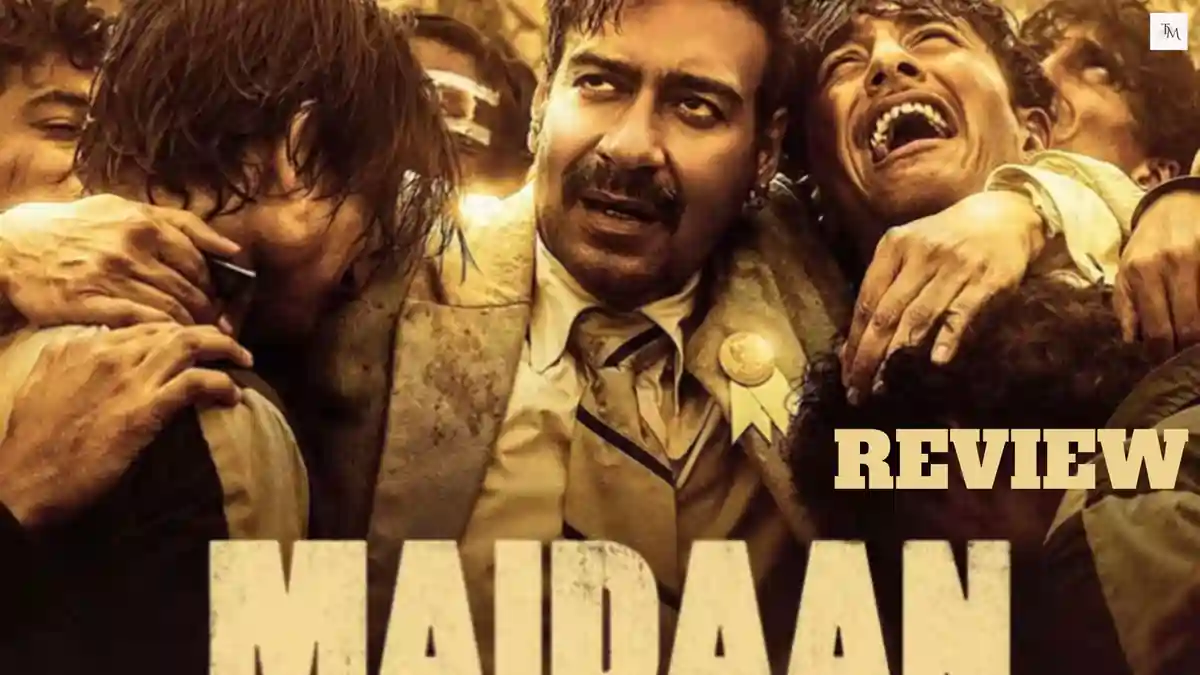Maidaan Review: In 2019, work on a film began. A sports biopic was made. That focuses on football, the most rarely seen in India. The story of a man who supervised all of the Indian nation’s football coach team.
With his help, the team made waves throughout the world. Won gold medals throughout the Olympics, including the Asian Games.
Thus, the decades 1950- 1960 are known as”the “golden time” in Indian football time. Syed Abdul Rahim was the name given to that charming gentleman. ” Maidaan” is the film’s name created for his life.
| Movie | Maidaan |
| Director | Amit Sharma |
| Writers | Saiwyn Quadras, Aman Rai, Atul Shahi, Ritesh Shah, Siddhant Mago, Amit Sharma |
| Cast | Ajay Devgn, Priyamani, Gajraj Rao, Rudranil Ghosh, Chaitanya Sharma, Madhur Mittal, Tejas Ravishankar, Amartya Ray |
| Duration | 181 minutes |
Amit Ravindernath Sharma‘s biographical sports drama Maidaan is so real that you can almost touch the sweat, blood and tears that went into creating it.
Maidaan Movie Review
It’s about the head coach, Syed Abdul Rahim, and his determination to create an outstanding Indian Football team and win the gold medal. The story began in 1952 when the players suffered injuries playing barefoot and the Indian team was defeated in the match.
Not only does Syed ensure that the top players from all over India are playing together, but he also ensures that they wear high-quality footwear and come back with gold. He fights his issues and challenges the system in all this.
The film covers ten years of Syed Abdul-Rahim’s life, starting with the notorious 10-1 “bare feet” beating by Yugoslavia during 1953’s Helsinki Olympics through the glory and sadness that followed the 1952 Asian Games.
It is one of the most impressive choreography for sports ever since Chak De! Hockey matches in India are shown in the film (2007).
The film is a fan of the speed of football’s visuals. It adores underdog narrative cliches. It loves the style of the movies of the past.
The reason for Maidaan’s demise is the film’s self-indulgence. The film’s 181 minutes are packed with over-the-top dramatic overtakes and narrative snares, making it impossible not to look at its reflection in the mirror.
Ironically, it places”the “Main ” (I) on Maidan in the context of cooperation, which is the primary goal of the sport.
It’s like watching a never-ending penalty shootout resulting from, and even the transitions are slow. One can’t help but think of comparisons of Chak De. A unique coach can bring an entire group of young newcomers across the country.
He conveys a sense of unification and stresses the advantages of “India” over Bengal and Hyderabad. He is confronted with opposition and hatred from within the system.
They astonish everyone in the international arena by defying the establishment. The tournament pattern is widely known: India loses to the favourite in the opening game and then plays them again in the final.
In the evening before the match, Rahim is seen walking out onto the grass. The game plays out like an action film that combines intense football action and war-scene photography to create a captivating overall. The players give their bodies and spirits instead of kicking and running.
The details are excellent. The players are completely absorbed in fighting, so they can’t hear the final warning siren. They will only allow themselves to be a part of the adversaries once they can stop moving.
In Addition, You Can Add Unnecessary Obstacles And Obstacles
The public is usually tricked into believing that the content in many sports biopics is thrilling. However, it’s the big-picture excess in Maidaan that constantly falls short.
The over-the-top screenplay has no faith in the film’s background. The idea of a “Golden age of Indian football” is not without risk, particularly in light of the nation’s previous struggles with the sport.
Additionally, there’s the problem of a Muslim man who is influencing post-Partition India’s identity. In the boardroom, bias is caused by both culture and male self-interest.
Rahim is elected back as a coach in a few instances and is a vocal opponent mocking his “democracy” that is the basis of this process.
There isn’t a need for many external challenges or adversaries because the odds are already built-in and easy to understand. That’s precisely the way Maidaan does.
If there’s no bomb as well as a ball or nuclear Armageddon, it increases the odds so much that there’s nothing to be overcome.
At the beginning of the film, Rahim’s return is characterised by the lung cancer he has contracted. In the closing minutes of the film, there are incredible shots of his coughing.
The man’s suffering serves as the background music’s purpose, and, with the exception of one poignant scene (when the illness makes him want to visit his family members while the tune “Ghar Aaya Mera Mirza” plays), the music never stops.
After that, there’s the football federation office, where the bureaucrats of Bengal are stuffed with singing arias (samosas) and chuckle. The president Rudranil Ghosh is a hammy who puts the lovable Dick Dastardly in shame.
In a film that veers away from social critique, There’s a cigarette-smoking writer for a sports magazine (Gajraj Rao) whose resentment towards Rahim appears to be random.
In their first meeting, Rahim belittled him with an unkind rebuttal that contained an ode to Elvis Presley.
In a bizarre way, these two animated live shows vow to end Indian football. The desire to maintain Calcutta’s dominance and end Rahim’s Hyderabadi influence is misinterpreted.
Imagine what would have happened if Chak De had played the federation’s chairman and was played by Anjan Srivastava, the antagonist, to ensure that his appearance in the final scene – with his shocked and harsh glares at the coach have intensified the hero’s journey toward atonement.
This is a ploy since individuals such as Syed Abdul Rahim, Kabir Khan, and their team members can praise their achievements without using these flimsy tools.
Selling the Handicap
Alternatively, Maidaan is always asking whether winning is winning if it does not include a manager from a rival team who appears to be attempting to stage an attack of the heart in the semifinal game instead of reacting to the game as a good scribe, his sycophant causing a scene in the crowd, a riot in the stadium and a finance minister who is hesitant to cover the cost of the excursion?
This is a reinterpretation of a rhetorical question: Is it even possible to appreciate a film or other form of art without understanding the love and sacrifices involved in its making?
This argument is in line with the notion of persecution that many nationwide achievements have as their base.
If the victory isn’t tied to victimhood, it’s not meaningful. This argument also is not able to stand on its own since it is too concerned with the selling of disabled persons.
Due to this, most genre cliches are fake. ” Team India Hai Hum” is a boring song that plays during Maidaan’s training sequence. It appears that the recruitment montage is gone.
Visual effects (VFX) and stage designs that reflect the craftsmanship of the Zack Snyder universe include crowded stadiums, clouds, and exotic backdrops such as Rome, Jakarta, or Bombay’s Oval Maidan.
They’re a collection of stereotypes (with particular homage to the Australian coach, who is almost singing his snide remarks). There’s a disturbing soundtrack.
The film deserves a star for the use of words, and that’s the reason why the film’s version of Chak De’s famous “Sattar Minute” speech focuses on the first word (“ek”).
Between introducing the games, reciting the script, and explaining football and football terminology, the Indian commentators flit around.
The performances, however, provide a different effect than the legacy. Other than the well-known personalities, including PK Bannerjee, Chuni Goswami and Peter Thangaraj, the acting is limited only to the field. Even though the cast of supporting characters plays an acceptable role, they cannot stand out from the crowd of the entire group.
However, senior players have their own mistakes. Devgn’s style is so subdued that Rahim does not appear to be a coach for football because of his body language and speech.
He is almost a blur of silence. Apart from one incident that saw him outclass an outstanding striker, There is no evidence of his passion for the game or a sign of his managerial skill.
In the beginning, the cigarettes appear to be props that are forced in the first half, and he chains and smokes as if he is aware that he’s likely to develop lung cancer.
The main character only appears to be alive when he’s roaring with rage. Otherwise, his dark eyes become somewhat monotonous.
Although football can be a powerful metaphor for the world, the film performs slightly better than it does at the conclusion.
Also, Maidaan scores during stoppage time, but more is needed to salvage the outcome. The winnings do not always result from a thrilling final. Sometimes, the gap between a victory and a defeat could be better.
Maidaan Box Office Collection Day 3: Ajay Devgn’s Movie Saw An 83% Increase On The Weekend And Raked In Rs 5.5 Crore
Maidaan Box Office Collection Day 3: Ajay Devgn’s latest film, Maidaan, recorded an 83.3 percent increase on Saturday and raked in Rs 5.5 crore for Day 3.
On Day 0 (a day prior to the date of release), the film had an unpaid preview, and it earned Rs2.6 crore. This is not a huge amount for a major Bollywood star such as Ajay Devgn, but it was a lot less impressive considering the film was Eid.
According to Trendsmyth, the number was less than HanuMan’s Telugu rendition. Teja Sajja’s film earned Rs4.5 crore from the preview paid for.
Maidaan is inspired by the story of Team India Coach Syed Abdul Rahim, who founded the modern era of Indian football and coached between 1952 and 1962.
It’s written by Amit Ravindernath Sharma, who is known as the director of Tevar, Badhaai Ho, and Lust Stories 2.
On the day of its release, Maidaan earned Rs 4.5 crore. On Friday, the figures dropped to just three crore. The total domestic haul currently stands at Rs15.6 crore.
Apart from Devgn, the film also has Priyamani, Gajraj Rao, and Rudranil Ghosh as critical characters.
The film also stars several youngsters, such as Chaitanya Sharma (as PK Banerjee), Amartya Ray (as Chuni Goswami), and Sushant Waydande (as Tulsidas Balaram).
Maidaan is the sequel to Ajay Devgn’s previous release, Shaitaan. The supernatural thriller, which was released on March 8, made Rs205.18 crore worldwide. The film also features R Madhavan, Jyothika, Janki Bodiwala and Anngad Raaj.
SEE ALSO: BMCM Review: Akshay & Tiger Can’t Attract Fan’s Attention, Movie Gone Big Flop Now!











1 thought on “Maidaan Movie Review, See Ajay Devgan’s New Movie How Perform on Box Office”